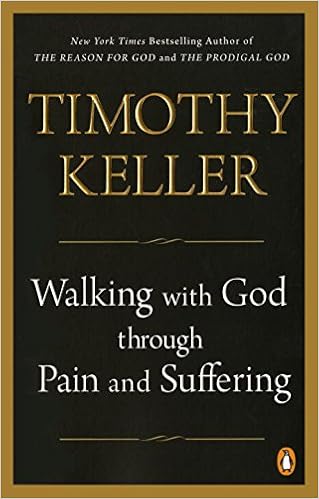
“The Varieties of Suffering”—Keller’s title for Chapter Ten in his book very much worth reading . . .

https://www.amazon.com/Walking-God-through-Pain-Suffering/dp/
1594634408/ref=sr_1_1?ie=UTF8&qid=1487880186&sr=8-1&keywords=walking+with+god+through+pain+and+suffering+by
+timothy+keller
DIVERSITIES OF SUFFERING
A “one size fits all” prescription for suffering won’t work, because kinds of suffering are varied as are the personalities and spirituality of the sufferers.
JONAH, DAVID AND THE SUFFERING WE SELF-INFLICT
A husband has sex with a woman not his wife. He’s found out. His wife files for divorce. He’s separated from his children (except for alternate weekends). He’s brought suffering on himself.
A life-threatening storm engulfed Jonah. A worm ate his shade tree. In the first case, Jonah was running from God. In the second, Jonah was pouting because his enemies, the Assyrians, had repented and escaped God’s judgment. In both cases, God was trying to show Jonah the evil in his heart.
David lusted after Bathsheba, another man’s wife. After sex produced a son, the child died—and David’s life largely fell apart. God was using that brokenness to awaken him to his sin and turn David back to himself.
On the other hand, Job did nothing to cause his suffering. It’s crucial we see the difference in our own suffering. At the same time, a Christian “must not . . . miss this opportunity to put his roots deep into God and discover a dimension of spiritual growth and wisdom he would never otherwise have had access to” (Keller, p. 208).
PAUL, JEREMIAH, AND BETRAYAL-SUFFERING
Paul’s and Jeremiah’s suffering was both caused by the betrayal or attacks of others.
Paul was beaten, imprisoned and attacked by his own Jewish people and by Gentiles (2 Corinthians 11:23-29). Jeremiah was held in stocks and put in prison just for “speaking the truth to power” (Jeremiah 20:1-6).
Today an employee might become the object of attack for taking an unpopular political position. If someone thinks he has been wronged by a friend, he might try to hurt his “friend” or damage his reputation.
All are examples of suffering by betrayal.
MARY, MARTHA, AND LOSS-SUFFERING
This is the kind of suffering that crushes one with grief. Though this comes to everyone, there are many varieties—a spouse’s death after 50 years of marriage to the death of a young child, the slow decay of aging to death by an automobile accident.
Paul directs us not to “grieve like the rest of men, who have no hope” (1 Thessalonians 4:13) and reminds us that “ . . . our light and momentary troubles are achieving an eternal glory that far outweighs them all. So we fix our eyes not on what is seen, but on what is unseen” (2 Corinthians 4:16-18).
JOB AND MYSTERY-SUFFERING
This is the suffering of which Psalm 44 speaks . . .
All this has come upon us, though we have not forgotten you, and we have not been false to your covenant. Our heart has not turned back nor have out steps departed from your way; yet you have broken us in the place of jackals and covered us with the shadow of death . . . Why do you hide your face? Why do you forget our affliction and oppression? (Psalm 44:17-19,24).
Job, remains the classic example.
Keller observes what we all have seen or endured: “When people experience horrendous, unusually severe suffering, it leaves the sufferer not so much filled with guilt, or resentment toward others, or pure grief—but with anger toward life and God himself . . . [Job] was being led to the place where he would obey God simply for the sake of who God is, not in order to receive something or to get something done . . . Job-type suffering requires a process of honest prayer and crying, the hard work of deliberate trust in God, and what St. Augustine called a re-ordering of our loves” (p. 212,213).
DIVERSITIES OF TEMPERAMENT
Quoting Simone Weil (a French philosopher, mystic, political activist and teacher), Keller lists various aspects of affliction.
Isolation—barriers go up between the sufferer and anyone who hasn’t experienced the same suffering.
Implosion—the sufferer becomes self-absorbed.
Condemnation—the sufferer feels she’s being punished.
Anger—at oneself, others, God, or at the general injustice of life.
Diversities of temperament will determine which of these affliction-aspects a sufferer feels, what combination of them, and to what degree.
DIVERSITIES OF PATHWAYS
Because every affliction is unique, every sufferer needs to find her own pathway through it. Some “helps” are unhelpful for finding a pathway, such as those things we know in our mind are true, yet irritate or discourage at the time–statements like “we know all things are for the best and we know we have to trust God.”
That, of course, is true. But sometimes the sufferer has to cry out like David in the Psalms or like Job. In other words, the sufferer needs truth applied in the right order or for her pathway.
One sufferer was told by his father that “he shouldn’t expect to feel God’s grace and strength now for the whole ordeal ahead . . . God only promised today’s grace for today” (Keller, p. 217,281). It was like a ray of light breaking through.
“Everything is needful that [God] sends; nothing can be needful that he withholds” (John Newton in Keller, p. 219). Most helpful, yet not a “pill” for curing discouragement.
Keller insightfully comments on Psalm 23:4—“When I walk through the valley of the shadow of death, I will fear no evil, for thou art with me.” A precious promise to sink into one’s soul.
One size “encouragement” doesn’t fit every size sufferer . . .
“As it turns out, there is more than one path in that valley. And the Lord, the perfect Guide, will help you find the best way through” (p. 220).
Recent Comments